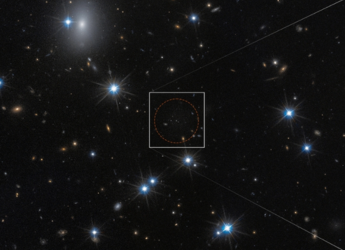- Home
- Science
- Science News
- SpaceX Launches Tiny Sea Creatures, Experimental Toothpaste, Solar Panels to ISS
SpaceX Launches Tiny Sea Creatures, Experimental Toothpaste, Solar Panels to ISS
SpaceX shipment also includes fresh lemons, onions, avocados, and cherry tomatoes for the station’s seven astronauts.

Photo Credit: NASA TV
The launch of NASA's 22nd SpaceX cargo resupply mission
SpaceX launched thousands of tiny sea creatures to the International Space Station on Thursday, along with a plaque-fighting toothpaste experiment and powerful solar panels.
The 7,300-pound (3,300-kilogram) shipment — which also includes fresh lemons, onions, avocados, and cherry tomatoes for the station's seven astronauts — should arrive Saturday.
????✅ Success! A SpaceX Dragon resupply spacecraft is on its way to the International Space Station after launching today at 1:29pm ET from @NASAKennedy in Florida, carrying more than 7,300 pounds of science experiments, new solar arrays, & other cargo: https://t.co/JGprErjk60 pic.twitter.com/ihnV5htGqI
— NASA (@NASA) June 3, 2021
SpaceX's Falcon rocket blasted into the hazy afternoon sky from Kennedy Space Center. The first-stage booster was new for a change, landing on an offshore platform several minutes after liftoff so it can be recycled for a NASA astronaut flight this fall.
The Dragon cargo capsule — also brand new — is delivering the first of three sets of high-tech solar panels designed to bolster the space station's aging power grid. Astronauts will conduct two spacewalks later this month to help install the two roll-out panels alongside solar wings that have been in continuous operation for 20 years.
More power will be needed to accommodate the growing number of ticket-buying visitors, NASA's space station programme manager, Joel Montalbano, said Wednesday.
The cargo includes samples of saliva and oral bacteria from dental patients that will be treated with toothpaste and mouthwash in an experiment aimed at keeping astronauts' teeth and gums healthy in space.
“There's no guarantee that the Earth methods will work in zero gravity,” researcher Jeffrey Ebersole of the University of Nevada Las Vegas said in a statement.
Also headed to the orbiting lab: 20,000 tardigrades, better known as water bears, and 128 bobtail squid, as well as chile pepper plants, and cotton seedlings.
Tardigrades can survive in drastic environments on Earth and even in the vacuum of space. Launched frozen, these microscopic extremophiles will be thawed and revived aboard the space station. By identifying the genes behind the animals' adaptability, scientists hope to better understand the stresses on the human body during long space stays.
The baby bobtail squid are part of a study investigating the relationship between beneficial bacteria and their animal hosts.
This is SpaceX's 22nd station supply run for NASA. The space agency turned to private companies to transport cargo and astronauts following the shuttles' retirement a decade ago.
Get your daily dose of tech news, reviews, and insights, in under 80 characters on Gadgets 360 Turbo. Connect with fellow tech lovers on our Forum. Follow us on X, Facebook, WhatsApp, Threads and Google News for instant updates. Catch all the action on our YouTube channel.
Related Stories
- Samsung Galaxy Unpacked 2026
- iPhone 17 Pro Max
- ChatGPT
- iOS 26
- Laptop Under 50000
- Smartwatch Under 10000
- Apple Vision Pro
- Oneplus 12
- OnePlus Nord CE 3 Lite 5G
- iPhone 13
- Xiaomi 14 Pro
- Oppo Find N3
- Tecno Spark Go (2023)
- Realme V30
- Best Phones Under 25000
- Samsung Galaxy S24 Series
- Cryptocurrency
- iQoo 12
- Samsung Galaxy S24 Ultra
- Giottus
- Samsung Galaxy Z Flip 5
- Apple 'Scary Fast'
- Housefull 5
- GoPro Hero 12 Black Review
- Invincible Season 2
- JioGlass
- HD Ready TV
- Latest Mobile Phones
- Compare Phones
- Realme P4 Lite
- Vivo V70
- Vivo V70 Elite
- Google Pixel 10a
- Tecno Camon 50
- Tecno Camon 50 Pro
- Lava Bold N2
- Vivo V60 Lite 4G
- Asus Vivobook 16 (M1605NAQ)
- Asus Vivobook 15 (2026)
- Infinix Xpad 30E
- Brave Ark 2-in-1
- Amazfit T-Rex Ultra 2
- boAt Chrome Iris
- Xiaomi QLED TV X Pro 75
- Haier H5E Series
- Asus ROG Ally
- Nintendo Switch Lite
- Haier 1.6 Ton 5 Star Inverter Split AC (HSU19G-MZAID5BN-INV)
- Haier 1.6 Ton 5 Star Inverter Split AC (HSU19G-MZAIM5BN-INV)






![[Partner Content] OPPO Reno15 Series: AI Portrait Camera, Popout and First Compact Reno](https://www.gadgets360.com/static/mobile/images/spacer.png)








